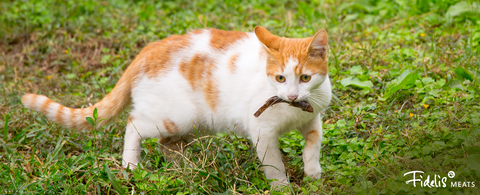|
Cats, like any other human or animal, require a biologically appropriate diet to meet their nutritional needs, provide energy, and help them stay healthy and survive. Unlike dogs, which are facultative carnivores that can consume plants, cats are obligate carnivores that must consume meat to survive - their digestive system isn't designed to handle a plant-based diet, and they will not absorb nutrients from a plant-based diet.
What are some essential nutrients your cat needs and what kind of food can these nutrients be found in?
-
Animal Protein
Animal protein contains the essential amino acids required by cats. Protein must account for 25% of a cat’s dietary calories in order to fuel their bodies and nervous systems, grow a healthy coat, and ensure a functioning immune system.
There are many essential amino acids, fatty acids and vitamins in animal protein that cannot be found in plant sources. These nutrients are essential for healthy eyes and the heart, and the lack of these nutrients can lead to serious health problems such as heart diseases.
Feeding your cats a balanced diet that includes meats such as turkey, chicken, or beef, as well as fish and eggs can help to ensure that they consume a healthy amount of protein daily.
-
Fats
Cats get their main source of energy from animal fats. They rely on “good fats” naturally present in meat and fish such as Omega-3 and Omega-6 fatty acids to regulate their body temperature, gain energy, as well as provide a source of vitamins A, D, E and K. Sources of healthy fat include salmon, tuna, mackerel, and sardines.
These healthy fats can also help to boost your cat’s immune system, keep its coat shiny, and provide a delicious meal. Raw cat food is healthier for your cat because seasonings can be a source of toxins, and cooking it can destroy some of the healthy fatty acids in the meat.
-
Vitamins
Vitamins are essential for all animals, including humans, and it is important for cats to consume them in the right amounts. Here are some vitamins your cat needs.
-
Vitamin A: Essential for a strong immune system and healthy vision. However, too much vitamin A can be toxic. They are found in animal meat, particularly in the liver and fish oil.
-
Vitamin D: Vital for the balance and retention of calcium and phosphorus in a cat’s body, and helps the bones, nerves, and muscles function properly. However, excess vitamin D can also be toxic. They can be found in fatty fish, fish liver oils, egg yolks and beef liver.
-
Vitamin B1: Necessary for the healthy metabolism of carbohydrates and the maintenance of normal growth and nerve impulse transmission. The most common sources of vitamin B1 are liver, meat, dairy, and whole grains.
-
Vitamin B2: Important for growth and overall health. Helps the body break down carbohydrates, proteins, and fats to produce energy and allow the body to use oxygen. It also improves the condition of your cat’s skin and coat. Vitamin B2 can be found in eggs, liver, and pork.
-
Vitamin B3: Maintains a healthy nervous system, gastrointestinal functions, and healthy skin. Vitamin B3 is rapidly excreted in a cat’s urine, hence it must be regularly replenished through food sources. They can be found in liver, chicken, tuna, salmon and anchovies.
-
Vitamin B6: Important for healthy immune function and red blood cell function. It can be found in protein-rich foods like kidney, tuna, and poultry.
-
Minerals
Minerals help with enzyme formation, pH balance, nutrient utilisation, and oxygen transportation. They are essential to a cat’s health and must be supplemented with food.
-
Iron: Helps to boost red blood cell production for healthy immune function. It can be found in liver, lean meats, fish, whole grains and legumes
-
Calcium: Important for a cat’s overall health, including bone growth and formation, blood coagulation, muscle contraction and nerve impulse transmission. Present in dairy products, eggs, bones, and leguminous plants.
-
Magnesium: Keeps your cat’s overall health well-balanced and helps your cat absorb and use certain vitamins and minerals. It is also essential for bone growth, enzyme functions, and the production of protein. Magnesium can be found in whole grains, soybeans, milk, and fish.
-
Sodium: Aids in the transport of nutrients to cells, the proper function of nerve and muscle cells, and the removal of waste products. Too much sodium can be harmful to your cat, so the natural amount of sodium found in the raw cat food that you feed your cats is adequate.
-
Water
Finally, hydration is essential because it aids in the proper distribution of nutrients, the maintenance of body temperature, the elimination of toxins, and the metabolization of nutrients.
Cats are particularly susceptible to dehydration because they don’t feel the urge to drink water like other animals. Their bodies are conditioned to get most of the moisture they need from their food, hence it is important to always feed them food high in moisture, such as raw cat food. Dehydrated and processed foods can cause dehydration in your cats.
Besides wet food and raw cat food, always remember to leave a water bowl out for your cats to constantly hydrate themselves because the lack of hydration can lead to kidney diseases.
Feeding your cat a biologically appropriate diet is not difficult if you understand what a cat requires and what is harmful to your cat. To make shopping for cat food easier, Fidelis Meats, an online pet food store in Singapore dedicated to providing all pets with a wholesome, all-natural, and balanced diet, offers a variety of beneficial raw cat food.
Order your pet food online today.
|



